
Students will rewrite a modern song with lyrics summarizing reasons for exploration and colonization
- Subject:
- Social Studies
- Material Type:
- Activity/Lab
- Author:
- William Allred
- Carrie Robledo
- Date Added:
- 05/18/2021

Students will rewrite a modern song with lyrics summarizing reasons for exploration and colonization
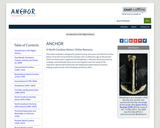
This online textbook is designed for grade 8 and up and covers all of North Carolina history, from the arrival of the first people some 12,000 years ago to the present. There are eleven parts, organized chronologically, a collection of primary sources, readings, and multimedia that can be rearranged to meet the needs of the classroom. Special web-based tools aid reading and model historical inquiry, helping students build critical thinking and literacy skills.
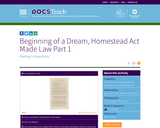
In this interactive online lesson, students will examine primary sources to help them understand relationships among events. After each document or set of documents that relate to the Homestead Act of 1862, students will be asked to make the connection between the documents.
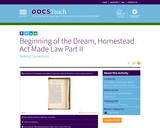
In this interactive online lesson, students will examine primary sources to help them understand relationships among events. After each document or set of documents that relate to the Homestead Act of 1862, students will be asked to make the connection between the documents.
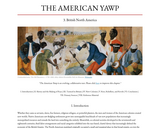
A chapter from The American Yawp open source history textbook focusing on, "British North America."
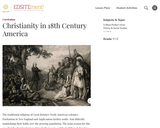
The traditional religions of Great Britain's North American colonies had difficulty maintaining their holds over the growing population. This did not, however, result in a wholesale decline in religiosity among Americans. In fact, the most significant religious development of 18th century America took place along the frontier, in the form of the Great Awakening. This curriculum unit will, through the use of primary documents, introduce students to the First Great Awakening, as well as to the ways in which religious-based arguments were used both in support of and against the American Revolution.

In this lesson, students read about how the British and French clashed over control of the North American interior during the 1700s. A set of discussion questions is provided. In an associated activity, students will role play five groups that had a stake in North America just before the outbreak of the French and Indian War in 1754.
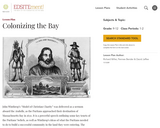
This lesson focuses on John Winthrop's historic "Model of Christian Charity" sermon which is often referred to by its"City on a Hill" metaphor. Through a close reading of this admittedly difficult text, students will learn how it illuminates the beliefs, goals, and programs of the Puritans. The sermon sought to inspire and to motivate the Puritans by pointing out the distance they had to travel between an ideal community and their real-world situation.
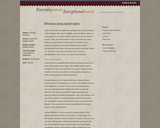
Students will explore the differences among the three colonial regions of New England, Mid-Atlantic / Middle, and the Southern colonies. In small groups for each region, students will observe and note details of pictures, maps, and advertisements in order to describe each region.

Students will explore the first five settlements during the colonization of North America. In groups, students will research an assigned settlement then prepare a skit to teach classmates important information about that settlement. Students will culminate the lesson by creating either a letter to the King/Queen requesting a colony charter or a poster for recruiting settlers to their existing colony.
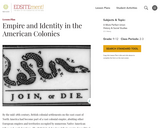
In this lesson students will examine the various visions of three active agents in the creation and management of Great Britain's empire in North America: British colonial leaders and administrators, North American British colonists, and Native Americans.

Students will explore the potential impact the Great Awakening on the colonists' desire to declare their independence from England.

George Whitefield was one of the most influential preachers in Britain and North America in the 18th century and an important figure in the First Great Awakening. In this lesson, students will critically examine three historical documents to answer the question: Why was Whitefield so popular? In doing so, they will practice key aspects of historical thinking.
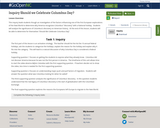
This inquiry leads students though an investigation of the factors influencing one of the first European explorations of the New World to determine why America recognizes Columbus’ “discovery” with a National holiday. Students will analyze the significance of Columbus’s discovery on American history. At the end of this lesson, students will be able to determine for themselves “Should We Celebrate Columbus Day”.
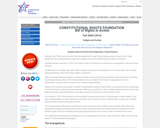
In this lesson, students learn about the Christian religious revival known as the Great Awakening. A set of discussion questions is provided. In an associated activity, students consider the question: "Was the Great Awakening a rehearsal for the American Revolution?" Students will write an essay, defending their position on this question with evidence from the reading.
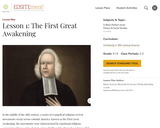
In the middle of the 18th century, a series of evangelical religious revival movements swept across colonial America. By examining primary documents from the time, this lesson will introduce students to the ideas, practices, and evangelical spirit of the First Great Awakening.

Students will examine content related to mercantilism. Students will use a map to identify political boundaries, analyze primary and secondary sources, and evaluate the impact of economic forces. Students will also participate in an activity to simulate the flow of goods and gold between colonies and the mother countries.
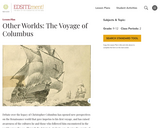
Students explore the two worlds that made contact when Columbus stepped ashore in the New World in 1492. The goals of this lesson are to gain an understanding of the forces within European society that found expression in the voyage of Christopher Columbus, to examine the cultures of those whom Columbus and his successors encountered in the New World, to analyze the degree to which cultural expectations shaped the encounter experience for Columbus, and to reconstruct the encounter experience for those who saw Columbus sail into their world.

In this lesson, students recognize reasons for isolation of the early Mormons and see how these factors set in motion a series of confrontations.

In this lesson, students explore the government of the Massachusetts Bay Colony. Discussion questions are provided. In an associated activity, students investgate and discuss whether the government was a theocracy, a democracy, or neither.